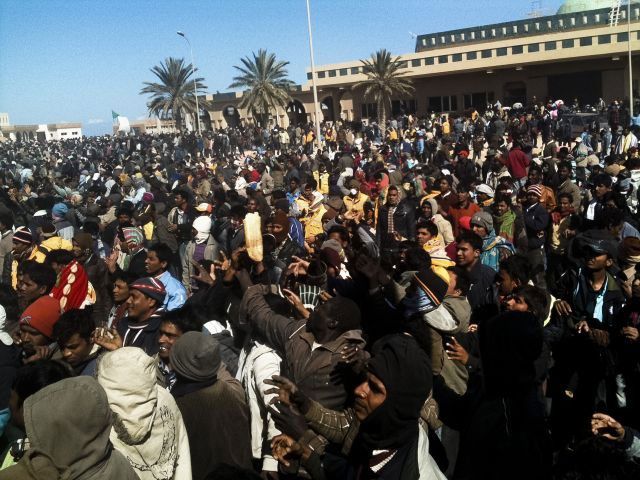Last Friday, the first MSF team was able to cross the Egyptian border, on the Eastern side of the country, and reach the town of Benghazi in Libya. For the past three days, the team has been assessing the situation in the hospitals of Al-Jalaa, Al-Hawari, 7 October and in the Benghazi Medical Centre (BMC) in Benghazi and surrounding area.
These medical facilities reported to have received over 1800 wounded people between 17 and 21 February. Each of them is well equipped and managed to take care of the wounded and medical needs. However, they are facing shortages in medical materials and drugs.
The MSF team donated medical supplies, including consumables, dressing, sutures, anaesthesia drugs, external fixators, to these health facilities. The team is also training local medical staff in the management of mass casualties, to be prepared in case of new clashes.
Eight tons of medical supplies, including surgical materials, have arrived in Benghazi and additional 12 tons of supplies are on their way from Egypt to Libya.
The MSF team in Benghazi is composed of eight staff, including three medical staff. An orthopaedic surgeon, an anaesthesiologist and an operating theatre nurse will join them today to assess the surgical needs of wounded patients in Al-Jalaa Hospital. Some patients currently hospitalized in this 400-bed trauma centre may require second-line surgery.
On the Western side of the country, an MSF team has been deployed at the (closed) Tunisia-Libya border, ready to cross the border with medical material to assist victims of violence inside Libya. A cargo with four tons of medical-surgical material arrived in Tunis over the week-end and will be channelled towards the border.
For the past days, thousands of migrant workers have been fleeing to Tunisia. The MSF team is assessing the situation in coordination with other actors on the ground, coping with the massive influx of people. The team is ready and equipped to address medical needs of people crossing the border, should the need arise, and will be reinforced with additional medical staff in coming days.
These medical facilities reported to have received over 1800 wounded people between 17 and 21 February. Each of them is well equipped and managed to take care of the wounded and medical needs. However, they are facing shortages in medical materials and drugs.
The MSF team donated medical supplies, including consumables, dressing, sutures, anaesthesia drugs, external fixators, to these health facilities. The team is also training local medical staff in the management of mass casualties, to be prepared in case of new clashes.
Eight tons of medical supplies, including surgical materials, have arrived in Benghazi and additional 12 tons of supplies are on their way from Egypt to Libya.
The MSF team in Benghazi is composed of eight staff, including three medical staff. An orthopaedic surgeon, an anaesthesiologist and an operating theatre nurse will join them today to assess the surgical needs of wounded patients in Al-Jalaa Hospital. Some patients currently hospitalized in this 400-bed trauma centre may require second-line surgery.
On the Western side of the country, an MSF team has been deployed at the (closed) Tunisia-Libya border, ready to cross the border with medical material to assist victims of violence inside Libya. A cargo with four tons of medical-surgical material arrived in Tunis over the week-end and will be channelled towards the border.
For the past days, thousands of migrant workers have been fleeing to Tunisia. The MSF team is assessing the situation in coordination with other actors on the ground, coping with the massive influx of people. The team is ready and equipped to address medical needs of people crossing the border, should the need arise, and will be reinforced with additional medical staff in coming days.


